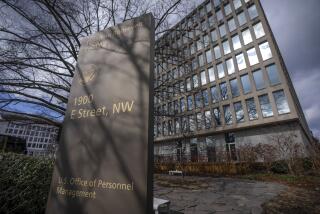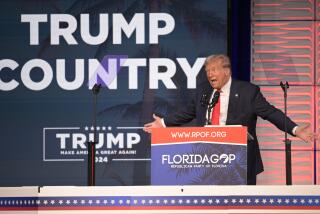Bush Likely to Reset the Bar for Federal Agencies
When George W. Bush moves into the White House, thousands of rules that govern everything from the energy your dishwasher uses to the labels on your clothes are likely to be overhauled in ways that favor powerful industries and anger consumer groups.
When it comes to setting policy for the 54 federal agencies that regulate health, the environment, labor standards, energy use and safety on the roads, rails, waters and in the air, Bush has made no secret of his pro-business leanings.
For the record:
12:00 a.m. Dec. 28, 2000 For the Record
Los Angeles Times Thursday December 28, 2000 Home Edition Part A Part A Page 3 Metro Desk 1 inches; 34 words Type of Material: Correction
Bush supporter--A story Monday incorrectly identified a business enterprise of Sam Wyly, a financial contributor and advisor to George W. Bush. He is on the board of directors of Green Mountain Energy, an Austin-based electricity provider.
And with many of the donors whose dollars propelled him into the presidency keenly interested in weakening regulatory standards that they believe cripple business, the likelihood that Bush will undo a host of tough regulations imposed during the Clinton years is high.
“We intend to submit regulations imposed during the previous administration to a strict and thorough review,” said Juleanna Glover Weiss, a spokeswoman for Dick Cheney, the vice president-elect and transition chief. Republican allies of Bush said that many of those regulations will not pass muster in a Bush administration.
Dismantling regulations could take years of jumping through procedural hoops, and changing the laws upon which the rules are based would require acts of Congress, which may not be disposed to cooperate.
But the new administration could use other means to alter federal rules. Its appointees to regulatory agencies can make significant changes in agency programs without congressional approval and without actually dismantling regulations. This fiscal year, that amounted to $20 billion in programs overall.
By exercising discretion over funding to their agencies, Bush appointees could make it difficult to enforce regulations aggressively. They also could require more consideration of the effect on industry when deciding whether and how to enforce regulations already on the books. And they could either reduce or freeze the work force at various agencies and reduce fines for breaking rules.
That prospect is savored by business but viewed with dismay by consumer advocates.
“We expect them to systematically stop certain things and to underfund others,” said Joan Claybrook, who headed the National Highway Traffic Safety Administration under President Carter and now works for the Ralph Nader group, Public Citizen.
“They will probably take a really harsh look at anything that happened in the last three months of the Clinton administration. . . . Getting regulatory activity going again will be very difficult, at least in a positive way.”
Arlie Schardt, founder of Environmental Media Services, which disseminates information concerning environmental issues, said agencies “don’t have to do anything other than not enforce any regulations. Who can make them do it?”
Although it is logical to expect that any Republican administration would arrive in Washington with less compunction to impose regulations that businesses consider onerous, such regulatory restraint could be particularly marked under Bush.
Supporter Cites Texas as Model
Bush’s campaign was funded by donations from entrepreneurs and financial and business interests at a level never before seen. His backers, whether small-business owners or representatives of Fortune 500 companies, were enthusiastic about his business-friendly record in Texas, where he simplified regulations on industry, championed tort reform, cut taxes and promulgated a philosophy of partnership with businesses that often allowed them to regulate themselves.
Sam Wyly, a Texas billionaire entrepreneur who was so determined to get Bush into the White House that he personally funded a $2.5-million advertising campaign during the Republican primaries targeting Sen. John McCain of Arizona, has a special interest in Bush’s philosophy on the environment.
Wyly--who is chairman of GreenMountain.com, a Vermont-based electricity provider--wants further deregulation of electricity markets and what he calls a business-friendly environmental policy that cuts requirements on industry. And as a confidant and lieutenant of Bush on environmental policy, he has had ample opportunity to make his views known.
“I think the governor has demonstrated that he understands this in Texas,” said Wyly, who also donated $250,000--the maximum amount accepted--to the Republican National Committee for the election campaign. “What has been done in Texas can be done all around the country, and it will [produce] big improvements for the environment.”
Already, a broad range of business groups and leaders is drawing up lists of rules that it wants withdrawn or reconsidered, as well as legislation favorable to the business community that it wants to see passed once Bush takes office.
The National Assn. of Manufacturers told both parties before the election that “the entire system of regulation needs overhaul.”
The U.S. Chamber of Commerce will ask the Bush administration to reopen the rule books on a number of hot-button issues, including ergonomics requirements, processing of affirmative action claims against federal contractors and regulations that define when employees are eligible for overtime pay.
“We would hope for an updating of those regulations, and we have talked about it with the Bush people,” said Randy Johnson, vice president of labor and employee benefits at the chamber. “No one expects the Bush administration to engage in any kind of wholesale rollback. But we do expect a more reasonable approach to regulations that are issued.
“A lot of the most crucial stuff happens below the regulatory level,” Johnson said. That includes “policing the career people in the regional offices to make sure there is a consistent enforcement policy. It’s ensuring that the agencies have less hostility to arbitration, for example.”
Changes Seen for Auto Industry
Auto safety is one controversial area in which the way regulations are implemented will have a substantial effect. Rules recently passed by Congress and signed by President Clinton require the highway traffic safety administration to devise new standards for automobile rollovers.
But the standards are still to be hashed out. That means everything could be revised, from what kind of rollover tests will be performed on cars and trucks to what speed vehicles will go during the tests.
“How to implement rollover standards will be highly technical, but can make a huge difference,” said former deputy administrator Phil Recht of the traffic safety agency. “You can say that no car can roll over in a certain test. And then the test becomes the issue.
“The agency administrators in the end are going to have to decide--when they have doubts, when they don’t have perfect data--are they going to side with the concerns of the auto industry or consumer groups? What are they going to do?” Recht added.
Mike Stanton, vice president of governmental affairs at the Alliance of Automobile Manufacturers, agreed that the Bush administration is likely to have a lighter touch than its predecessor when it comes to implementing regulations.
He cited a requirement under the Energy Policy and Conservation Act mandating that the administration and the traffic safety agency set new corporate average fuel-economy standards on cars and trucks. The Clinton administration has sought since 1994 to raise those standards on light trucks by about 40%.
“We would anticipate that the Bush administration would not see the need to do that so dramatically,” Stanton said. “The president-elect said in the campaign [that] he thought the current fuel economy levels were about right. That provides you some degree of comfort that they would not be seeking a large increase.
“From our view, the proposals on a whole range of issues will probably not be as distasteful or as extreme under the Bush administration.”
Technology industry leaders also say they expect the new administration will be hesitant to impose the kinds of regulations on electronic commerce that have been seriously discussed during the Clinton years. They expect less pressure to tax Internet commerce and to impose more stringent restrictions governing Internet privacy.
“My sense is the Bush administration is going to be very market-oriented,” said Greg Garcia, director of global government relations at the 3Com Corp. “By all indications, Bush is going to be very receptive to the high-tech industry in promoting the kinds of policies we think we need to get our growth going again.”
More to Read
Get the L.A. Times Politics newsletter
Deeply reported insights into legislation, politics and policy from Sacramento, Washington and beyond. In your inbox three times per week.
You may occasionally receive promotional content from the Los Angeles Times.






